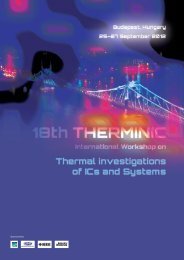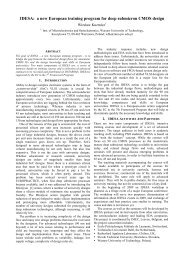Online proceedings - EDA Publishing Association
Online proceedings - EDA Publishing Association
Online proceedings - EDA Publishing Association
- No tags were found...
You also want an ePaper? Increase the reach of your titles
YUMPU automatically turns print PDFs into web optimized ePapers that Google loves.
allows creating special methods of analysis helping scientificresearch.III. CONCLUSIONSWe have designed a simulator engine that is able toperform logithermal simulations, i.e. logic simulations thatconsider thermal effects. Our simulator engine recordsglitches and calculates the dissipation of gates, determinesthe temperature distribution of a circuit and refreshes gatedelays according to the altered temperature values. Thus it iscapable of detecting changes that occur due to the warmingup of the circuit and that threaten to flaw signal integrity.The engine is easily extensible by any user thus allowingfor the simulation of arbitrary circuits. By the introduction ofpathfinders, the analyzing capabilities of the engine can bebroadened to an unlimited extent.REFERENCES[1] A. Poppe, Gy. Horvath, G. Nagy, M. Rencz, V. Szekely: „Electrothermaland logi-thermal simulators aimed at the temperature-awaredesign of complex integrated circuits”, 24th SEMITHERMsymposium, pp.69-77., San Jose, CA, USA, 16th-20th Mar 2008.[2] B. Lasbouygues, R. Wilson, N. Azemard and P. Maurine,“Temperature and Voltage Aware Timing Analysis: Application toVoltage Drops”, Design, Automation and Test in Europe, p. 1012,2007.[3] Y. Yang, Z. Gu, C. Zhu, L. Shang, R. P. Dick, “Adaptive Chip-Package Thermal Analysis for Synthesis and Design”, Design,Automation and Test in Europe, p. 844, 2006.[4] M. Pedram, Sh. Nazarian, “Thermal Modeling, Analysis andManagement in VLSI Circuits: Principles and Methods”,Proceedings of the IEEE, vol. 94, no. 8, August 2006.[5] Takashi Sato, Junji Ichimiya, Nobuto Ono, Koutaro Hachiya,Masanori Hashimoto, “On-Chip Thermal Gradient Analysis andTemperature Flattening for SoC Design”, IEICE Trans.Fundamentals, vol. E88-A, no. 12, pp. 3382-3389, December 2005.[6] M. Rencz, V. Székely, A. Poppe, K. Torki, B. Courtois, “Electro-Thermal Simulation for the Prediction of Chips Operation within thePackage”, Semiconductor Thermal Measurement and ManagementSymposium, pp. 168-175, March 2003.[7] Kholdun Torki, Florin Ciontu, “IC Thermal Map from Digital andThermal Simulations”, International Workshops on ThermalInvestigations of ICs and Systems, Madrid, October 2002.[8] M. Jakovljevic, P. A. Fotiu, Z. Mrcarica, V. Litovski, H. Detter,“Electro-thermal Simulation of Microsystems with mixed abstractionmodeling”, Microelectronics Reliability 41, pp. 823-835, 2001.[9] P. Israsena, S. Summerfield, “Novel Pattern-Based Power EstimationTool With Accurate Glitch Modelling”, IEEE InternationalSymposium on Circuits and Systems, May 28-31, 2000.[10] Yi-Kan Cheng, Prasun Raha, Chin-Chi Teng, Elyse Rosenbaum,Sung-Mo Kang, “ILLIADS-T: An Electrothermal Timing Simulatorfor Temperature-Sensitive Reliability Diagnosis of CMOS VLSIChips”, IEEE Transactions on Computer-Aided Design of IntegratedCircuits and Systems, vol. 17, no. 8, August 1998.[11] Vladimir Székely, András Poppe, András Páhi, Alpár Csendes,Gábor Hajas, Márta Rencz, “Electro-Thermal and Logi-ThermalSimulation of VLSI Designs”, IEEE Transactions on Very LargeScale Integration (VLSI) Systems, vol. 5, no. 3, pp. 258-269,September 1997.[12] Dirk Rabel, Wolfgang Nebel, “New Approach in Gate-Level Glitch-Modelling”, Proceedings of EURO-DAC’96 , pp. 67-71, 1996.[13] Dirk Rabel, Wolfgang Nebel, “Short Circuit Power Consumption ofGlitches”, International Symposium on Low Power Electronics andDesign, 1996.24-26 September 2008, Rome, Italy[14] M. Eisele, J.Berthold, “Dynamic Gate Delay Modelling for AccurateEstimation of Glitch Power at Logic Level”, Power and TimingModeling of Integrated Circuits, 1994.©<strong>EDA</strong> <strong>Publishing</strong>/THERMINIC 2008 234ISBN: 978-2-35500-008-9







